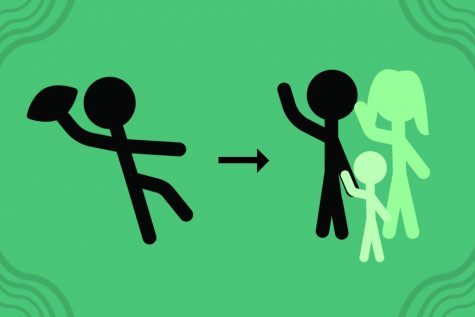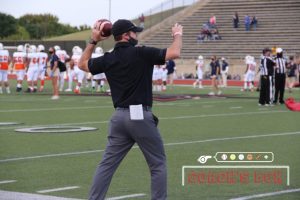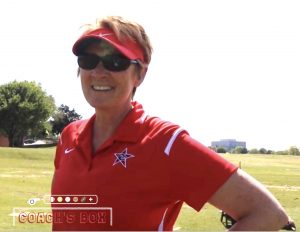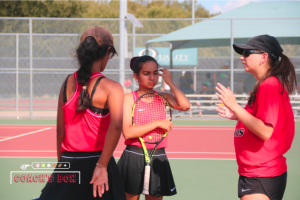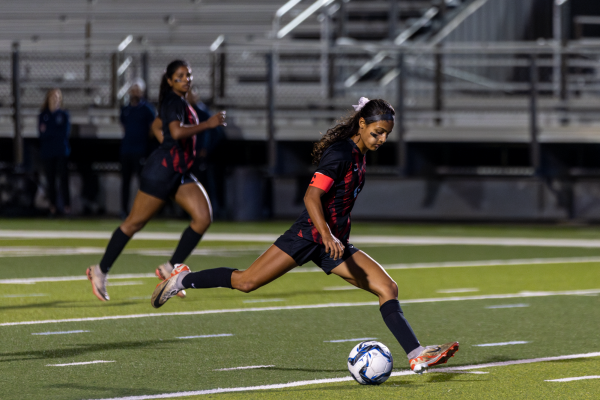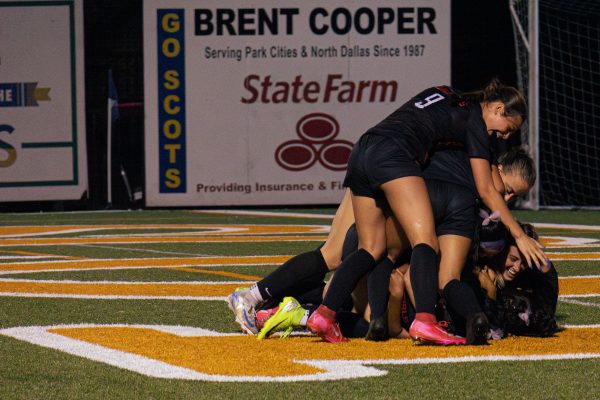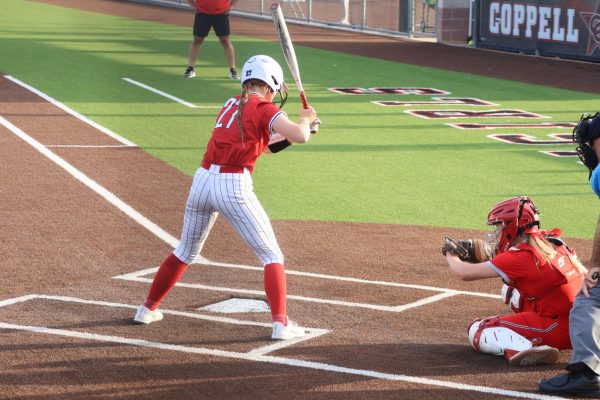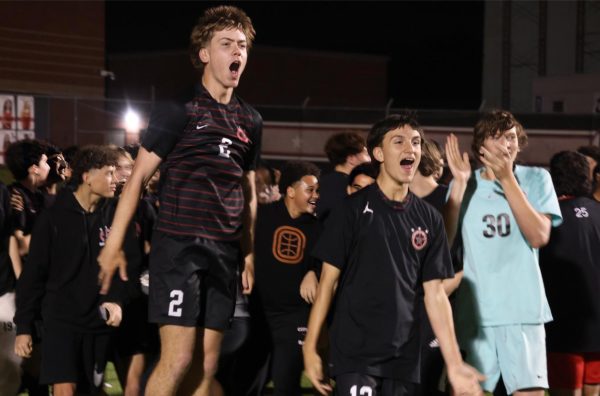“Better man, better husband, better father”
Analyzing role of coaches through lens of gender

Coaching philosophies serve as guidelines for how coaches lead the team, including morals and values beyond just the sport itself. Ask a male coach with a male team his coaching philosophy and a common answer might be some version of making his players a “better man, better husband, better father.”
Ask any coach with female players and it would be a rarity – if it were to happen at all – for their answer to be a version of making their players a “better woman, better wife, better mother.”
Though this difference in wording does not mean female athletes do not learn morals and values to carry into their daily life outside of sports, it does open the door to the difference in coaching mentalities when coaching male athletes compared to female athletes at the high school level.
“It’s a pivotal time in a young man’s life; they’re getting pulled in all different directions and they’ve got a lot of choices in front of them,” Coppell football coach Michael DeWitt said. “Hopefully, you can use your sport – in my case, football – as a carrot, as a motivator. Hopefully, you can, over time, lead by example because those kids are watching you and how you interact with authority.”
DeWitt incorporates the “better man, better husband, better father” mentality into his coaching philosophy.
“That’s why I got into coaching, to try and help kids,” DeWitt said. “Obviously, I’m a football coach, so [those kids are] young men. We all want to win on the field, but for me, it’s about trying to make an impact on them and try to make them become a better person, and at the end, a better man, so at the end of the day, they can become leaders in society, better husbands and better dads.”
Citing the role of coaches in life and the tendency for single-parent households to be majority single-mom, DeWitt thinks he is seen as a father-figure to some players. Football being one of the most popular sports in the United States for boys ties into the societal norm of boys playing sports, so as a football coach, his influence expands over a large number of players, this year being 76 athletes on the varsity team.
“I hope I can be a positive male influence to them, and if they don’t have a dad, then certainly, I want to stand in the gap and be someone they can look to as a father figure and help give direction and someone they know loves and cares about them,” DeWitt said. “I’m going to coach them hard, and I’m going to hold them accountable for things and discipline them the way I would my own son.”
The father-figure feeling persists through both sides, however, not solely resting in male athletes viewing their coaches. According to Coppell pole vault coach Don Kemp, he sees himself as a father figure for both his male and female athletes, following their accomplishments beyond just their time on the team.
“I was talking to some stranger, and one thing I was telling him was how ‘my kid did this, I have a kid in the Navy,’ and he goes, ‘You’ve got a lot of kids,’ and I go, ‘Well, I’m a teacher, they aren’t my kids, but they’re my kids,’” Kemp said. “I feel like I have ownership in their upbringing, whether it’s a guy or a girl, and I’m proud when I see that this person is a doctor or this person is a CEO.”
The sense of being a parental figure is also seen in female coaches on the motherly side, which is embraced as well.
“[Male coaches] seem to get a little more respect than female coaches, but I absolutely feel like a mother,” Coppell girls basketball assistant Julieann Hartsburg said. “You’re their mother, their nurse, their counselor, their friend. You’re their confidant whenever they just need to talk to you.”
In terms of coaching philosophy, the qualities meant to be transferred to athletes are the same for both girls and boys. However, this is not described often as being a better mother and wife, as that definition is still fluid in today’s society, not strictly being a stay-at-home mom or being a member of the workforce.
“For a guy, [being a good parent is] more about being able to provide for their family,” Hartsburg said. “For women, because we have less single-mother households in this area, it’s just going against that stereotypical ‘women are just to be stay-at-home moms or nurses.’ Nowadays, it’s about being able to fight and compete for all the other jobs guys do, so it’s not just being a mother or a wife figure, it’s maybe being as up there as other men or not being looked at as stereotypical women.”
This brings another difference in coaching philosophies beyond just the way it is verbalized: the incorporation of sexism. With a history of being excluded and discriminated against, women in sports are still actively combating inequality, which a lesson in persistence is often needed to be conveyed from coach to player. In addition, the current state of inequality – such as the difference in pay between the NBA and WNBA – mean sports hold another definition to women in terms of long-term goals.
“Girls do want to get college scholarships, they spend so much time and effort in their sport,” Coppell High School Principal Laura Springer said. “Now, every boy thinks they’re going to be in the NBA or the NFL, and I don’t think we women think that about ourselves. We think we’re going to go to college and then not many women think about pro basketball.”
The lack of a highly profitable future results in a different mentality when it comes to what sports mean to female athletes. A career in athletics is not as prevalent a dream compared to their male counterparts, which is something coaches are aware of. This could also slightly alter coaching philosophy, as the end goal is less sports-centered for more girls.
“Guys can do sports and I feel like that’s their end all be all. ‘I want to be in the NBA.’ For women, obviously it’s different,” Hartsburg said. “We love to play, but we don’t get paid as much in the WNBA, so where it differs is that it’s not just basketball for them; it’s family, it’s friends, it’s school. More often than not, there’s not as many girls who go to the WNBA, so they have to figure out what they’re doing after high school, what they’re doing after college. Some of them do make it to college, but after that, they have to prepare for other things, like ‘what is my secondary option for my career?’ Guys are more likely to go a little bit further as far as females in professional sports.”
In addition to perception of the sport as a part of their life, coaching a female team comes with a different method of teaching the technical skills required for the sport, which according to Hartsburg can be successfully done by male coaches, not solely female ones.
“The coaching is the same; girls just think differently,” Hartsburg said. “In the way you talk to them, you can’t necessarily talk to a girl the same way you can with a guy. With girls, you can’t just be ‘A to F,’ you have to be ‘A to B to C to D to E’ before you get to F. We’re very sequential. It’s the way you say it, not necessarily the philosophy. You learn the same things, but the way you get there is a little bit different. It requires a lot more patience and understanding of women in general.”
Despite the differences in technical coaching approach and verbiage used for coaching philosophy, the main post-athletic messages remain constant: improvement beyond just being a better athlete.
“At the end of the day, I want the kids that I coach to be better people, male or female,” DeWitt said. “If you can teach them to be a person of character, then at the end of the day, they can be a better mom, dad, husband, wife, coworker. For me, that’s the philosophy; it’s not just ‘better man’ or ‘better woman,’ it’s ‘I want to help these kids become the best version of themselves,’ and if you do that, they will be better citizens, better fathers, better moms.”
Follow Sally (@SParampottil) and @SidekickSports on Twitter.

Sally is a senior and the Executive Editor-in-Chief on The Sidekick. While she's done just about everything possible on staff, she loves writing for sports...

Srihari Yechangunja is a senior and the Executive Design/Interactive Editor for The Sidekick. In his free time, Srihari enjoys producing YouTube videos...




